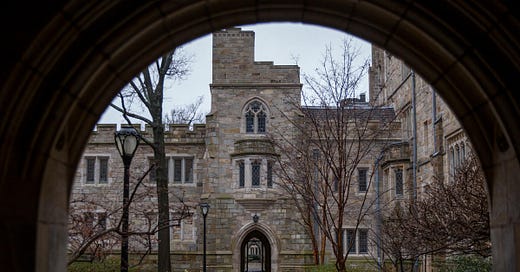
I used to teach a course at Yale on the history of campaign reporting. It was a super gig, well-paid, intellectually demanding, intellectually rewarding, and I threw myself into it. But I carried a secret with me I never revealed. I felt I didn’t belong.
The course fell into my lap. A friend had been teaching it (though on a different theme). Before they moved on, they recommended me. By that time, I had earned the recommendation. I was the top editor of New Haven’s alternative newsweekly, and before that I’d been at three small newspapers. (I was then only beginning to write about national politics.) Given that, hiring me was an easy staffing decision.
But, as I said, I felt like a stranger in a strange land. This was Yale, after all—Y a l e! This is where the Big Dogs ran, I believed. This is where Bob Woodward taught, and Steven Brill, too, and writers for the Times and The New Yorker. I wasn’t a Big Dog! Yet I felt like I had to pretend to be, because if I wasn’t, why was I teaching at Yale? And because I was pretending, I feared that any moment, someone would find me out.
Don’t get me wrong. I can’t think of one instance in which someone at Yale deliberately made me feel unwelcome. That’s not what I’m talking about. I’m talking about the feeling of being in a place that’s foreign, and for me, Yale was foreign.
I grew up in a trailer park in a county in western New York that had more cows than people in it. My first job, at 13, was pitching bales in hay season. My family had expectations, but they were religious. No one ever talked about careers, because we didn’t know anyone who had one. Men had jobs, sometimes women, too. But the point in life was family, faith, and preparing oneself to join our Heavenly Father. That I went to college at all was an accident of having enough musical talent to get attention.
I went to music school! I was going to teach children! Long story short, that didn’t work out. I fell in love, studied poetry (poetry!), read like crazy, struggled to find a way to make a living writing, got a lucky break at the Cincinnati CityBeat, followed my girlfriend (now wife) to Georgia, where I eventually wheedled my way into a job at the Savannah Morning News. Less than a decade later, I was teaching at Yale.
You might say, hey! You earned it! Why would you feel out of place? That’s what good friends have told me. And they are right; I did earn it. Still, I scarcely compared.
My colleagues wrote for the national news media, they graduated from elite colleges and universities, and they understood intimately, or seemed to understand intimately, the needs and desires of undergraduates who weren’t like any undergrads I ever before encountered. The prime directive, as it were, among people I went to music school with was jobs, jobs, jobs. The prime directive among Yalies? It wasn’t jobs. It was status or prestige or some intangible capital. Frankly, it’s so abstract I still don’t get it.
Eventually, I had a revelatory moment. It’s this revelatory moment I want to share with you a day after federal authorities in Boston charged some 50 very wealthy people with cheating to get their children into elite colleges and universities, including Yale.
I’m not going to name names. But this moment had to do with a disagreement with a superior over ethics in journalism. I knew the right answer for students learning the craft, and I knew my superior was guessing. I knew the right answer, because I had years of journalism experience. My superior did not know the right answer, because their experience wasn’t comparable. I suspected that my superior knew that I knew that they were guessing. And because they knew that I knew that they were guessing, they pulled ranked, as it were. They insulted me until I subordinated my view to theirs.
My point isn’t the disagreement. My point is what the disagreement tells me (and you) about merit, power, wealth and American aristocracy in an age when money and power equal morality and character. Many elites, though by no means all, want the rest of us to believe that they deserve their place at schools like Yale, and they spend a great deal of time demonstrating why. But there’s less here than meets the eye.
Many elites, though by no means all, aren’t certain why they deserve to be at places like Yale. (Many others know perfectly well why they “deserve” it, and they don’t bother with all the pretense.) What they do know, with real certainty, is that they are supposed to demonstrate their worth. But in demonstrating, they end up pretending, and in pretending, they end up living in fear that someone’s going find them out. Someone like me, for instance, who spent years working his way up the hard-news food chain, and who threatens to reveal a secret many elites carry with them.
Merit has little to do with it.
—John Stoehr

All the cool kids do it!
Subscribe to the Editorial Board to get daily intelligence sent straight to your email inbox every business day. It’s politics in plain English for normal people!
—JS


